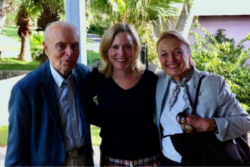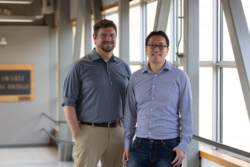
L to R: Jack Cogan with his daughter, Pam Cogan Riddle, and wife Mary Cornille, in 2012.
When members of the Cogan Family Foundation meet to consider making a gift to an organization, they inevitably ask each other one critical question: “Is this something Dad would have liked?”
Recently, they decided that John (Jack) F. Cogan Jr. would have wanted to continue supporting Boston Medical Center’s innovative research into Parkinson’s disease, which affects an estimated one million Americans. A lawyer, investor, philanthropist, and longtime trustee and chair of what was then Boston University Medical Center Hospital, now BMC, Cogan chose law school over medical school after being admitted to both but held onto a lifelong passion for medical research.
Cogan and his wife, Mary Cornille, started the Cogan Family Foundation in 2000. A year later, they began funding Parkinson’s disease research at BMC at the suggestion of Pam Cogan Riddle, Cogan’s daughter and the foundation’s managing trustee, whose maternal grandmother had the disease. The foundation’s efforts became even more personal when Jack was diagnosed with Parkinson’s disease in 2013. Since his death in 2020 at age 93, the family, including Riddle’s three brothers, has made two transformational gifts to support Parkinson’s research at BMC, including a $750,000 gift to the Cogan Family Foundation Parkinson’s Research Fund earlier this year.

L to R: Adam Labadorf, PhD, and Joey Orofino, PhD, are making strides in Parkinson’s disease research.
“The medical research we’ve funded has been cutting edge and at a stage that’s too early for NIH grant funding,” Riddle says. That seed funding helped a lab led by Adam Labadorf, PhD, make discoveries about the presence of microbes in cerebrospinal fluid from Parkinson’s disease patients and neurologically healthy individuals. Their project suggests microbes may play a role in many neurological diseases. Confirmation would open avenues of investigation, diagnostics, and potential therapies for many neurological conditions, including Parkinson’s. Collecting and analyzing the data to confirm this is challenging, but thanks to the Cogan gift, the team is developing novel computational methods to advance this work, increasing the potential for NIH funding to speed discovery.
“What’s exciting to me is the possibility of detecting Parkinson’s earlier,” Riddle says. “My hope is that people with an earlier diagnosis have a better chance of prolonging their lifespan and hopefully avoiding some of the more significant symptoms of Parkinson’s.”
A lifelong runner, Cogan in later years used a specialized walker to jog the length of his condominium complex’s parking garage to stay in shape, says Cornille. She envisions that type of determination would have served Cogan well if he had opted for medical school and believes he would have become a medical researcher, with his ability to persevere and his natural curiosity. “I think that he was interested in research because he saw it as a path to a better future,” says Cornille.
To make your own gift to support BMC, donate online.